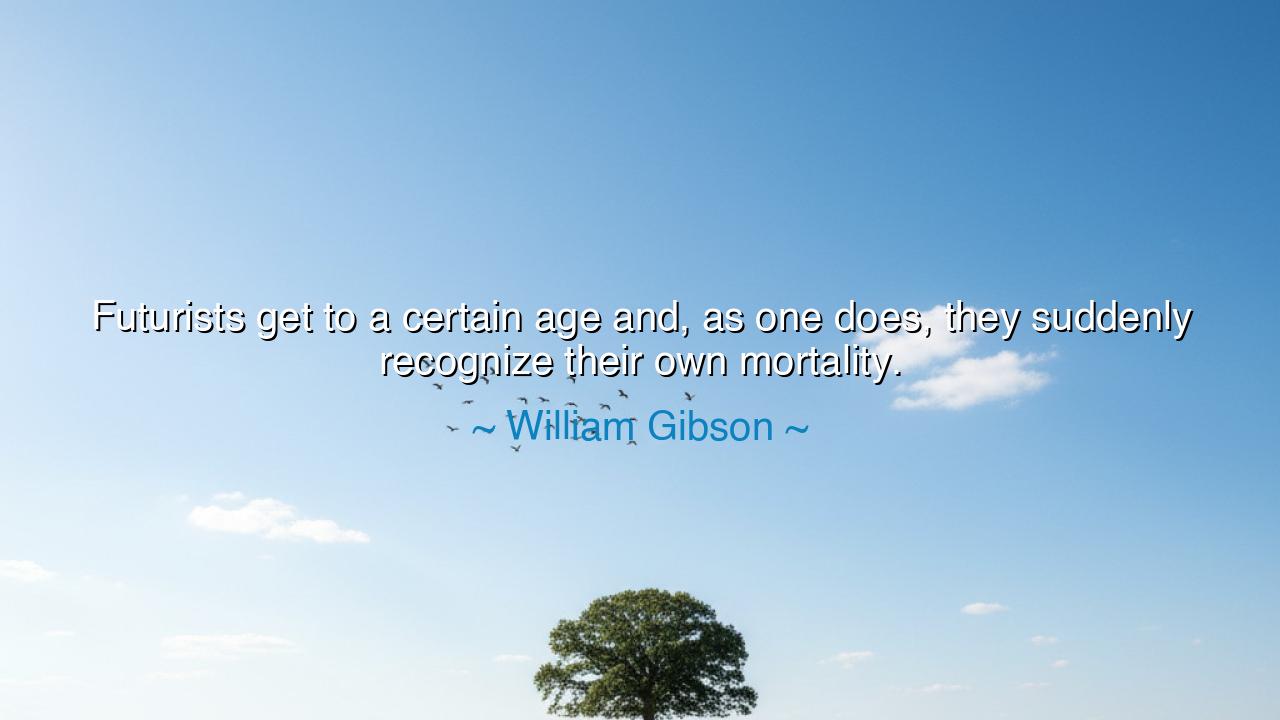
Futurists get to a certain age and, as one does, they suddenly
Futurists get to a certain age and, as one does, they suddenly recognize their own mortality.






"Futurists get to a certain age and, as one does, they suddenly recognize their own mortality." – William Gibson
In the unfolding narrative of human life, there comes a moment for all, no matter their pursuits, when the inevitability of mortality cannot be denied. William Gibson, the visionary behind the concept of cyberpunk and the father of much of our modern understanding of technology and its intersection with humanity, speaks here of a profound realization. Futurists, those who devote their lives to shaping and forecasting what is to come, spend their years looking ahead, imagining worlds where technology, society, and human nature evolve in radical ways. But, as Gibson insightfully points out, even those who seek to understand and control the future must, at some point, face the timeless truth of human impermanence.
This is not a new insight, nor a uniquely modern one. Ancient philosophers have long grappled with the concept of mortality, often framing it as the very core of human existence. The Greek philosopher Heraclitus once said, "You cannot step into the same river twice," a profound meditation on the ever-changing nature of the world and our fleeting presence in it. Just as the river moves on, so too do our lives, flowing inevitably toward an end that cannot be avoided. And even those who dedicate themselves to the great quest for understanding—whether through the arts, the sciences, or the contemplation of the future—must come to the realization that their time is but a brief moment in the endless passage of time.
In the same way that Heraclitus spoke of the river’s flow, so too does the futurist become acutely aware that their own journey is subject to the same forces of time. The very act of imagining the future—of shaping possibilities for a world that is yet to come—can make the futurist feel almost timeless. They envision worlds that will unfold centuries from now, yet, as Gibson points out, age brings with it the sharp awareness that their own days are numbered. This realization is not one of despair but of profound clarity. It is in the confrontation with our mortality that we understand the preciousness of our own lives and the fleeting nature of all things.
Consider the ancient story of Socrates, who, at the height of his intellectual journey, faced his own mortality with unwavering acceptance. When sentenced to death, he did not shrink from the reality of his end, but rather embraced it as part of the natural order. Socrates believed that true wisdom came not from fleeing death, but from understanding it—seeing it as a transition, a necessary part of the cycle of life. This acceptance of mortality allowed him to live with authenticity and purpose, undistracted by the fear of what was inevitable.
This insight is one that Gibson, like Socrates, points toward: that to embrace the future, one must first recognize the limitations of the present. The futurist's journey is not just about envisioning new worlds, but about acknowledging the world we currently inhabit, with all its flaws, challenges, and impermanence. It is through this acceptance of both our human frailty and the fleeting nature of time that we are able to engage with the future in a meaningful way. Just as Socrates found clarity in his acceptance of death, so too can we find purpose in the acceptance of our own mortality.
The lesson here is both humbling and empowering. Futurists, in their boundless vision of what is to come, must recognize that their lives are not infinite. This is not a call to despair, but to action. The realization of mortality should fuel not fear, but a renewed sense of purpose—a desire to leave behind something of value in the time that we have. Whether we are futurists, philosophers, or artists, the time we have is limited. Thus, we must live deliberately, understanding that the future we dream of can only be built through the choices we make in the present.
The practical wisdom for us all is clear: embrace the fleeting nature of life. Let us not spend our days running from the truth of our mortality, but rather face it squarely, knowing that in doing so, we free ourselves to live fully and purposefully. The future, like our lives, is full of uncertainty, but it is in acknowledging the unknown that we find the strength to create and shape what comes next.






AAdministratorAdministrator
Welcome, honored guests. Please leave a comment, we will respond soon